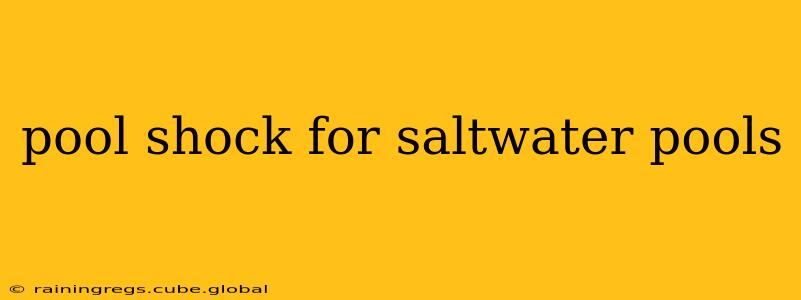Maintaining a sparkling clean and healthy saltwater pool requires diligent care, and understanding how to properly shock your pool is crucial. While the principles are similar to freshwater pools, there are some key differences when it comes to shocking a saltwater pool. This guide will delve into the specifics, addressing common questions and concerns.
What is Pool Shock and Why Do I Need It?
Pool shock, also known as chlorine shock, is a powerful oxidizer used to rapidly raise the chlorine levels in your pool water. This sudden increase in chlorine eliminates contaminants like algae, bacteria, and organic matter that traditional chlorine levels might not address effectively. Essentially, shocking your pool is a deep clean that helps maintain water clarity and safety. Even with a saltwater chlorinator, regular shocking is vital.
What Kind of Pool Shock Should I Use for a Saltwater Pool?
You can use calcium hypochlorite (granular shock) or dichlor (for smaller pools) in your saltwater pool. However, avoid using lithium hypochlorite as it can cause problems with your saltwater chlorine generator (SWG). Always check the packaging to ensure the product is compatible with saltwater systems. Choosing the right type of shock depends on several factors, including pool size and the severity of contamination. Consult your pool supply professional for personalized advice based on your pool's specific needs.
How Often Should I Shock My Saltwater Pool?
The frequency of shocking your saltwater pool depends on several variables: weather conditions, bather load, and how often you clean your pool. Generally, shocking once a week to once a month is sufficient for maintenance. However, you should shock more frequently (weekly or even bi-weekly) during periods of heavy use or extreme weather (hot, sunny days). After a storm, or if you notice cloudy water or algae blooms, it's essential to shock your pool immediately.
How Much Pool Shock Should I Use in My Saltwater Pool?
The amount of shock required varies considerably depending on the size of your pool and the concentration of the shock. Always follow the instructions carefully on the product label. Over-shocking can damage your pool equipment and even irritate swimmers. Under-shocking, on the other hand, will be ineffective in sanitizing the water. Using a pool calculator, readily available online, can help determine the precise amount of shock needed based on your pool's volume.
What Happens if I Over Shock My Saltwater Pool?
Over-shocking your saltwater pool can lead to several issues. High chlorine levels can damage your pool equipment, particularly your saltwater chlorinator (SWG) cell. It can also irritate swimmers' eyes and skin, causing discomfort and potential health problems. If you suspect you've over-shocked your pool, immediately test the water, and if the chlorine levels are excessively high, take steps to dilute the chlorine by running the pool pump and adding more water. Contact a pool professional for further guidance if you are unsure.
Can I Use Non-Chlorine Shock in a Saltwater Pool?
Non-chlorine shock, often containing potassium monopersulfate, can be used in saltwater pools, though usually only as a supplementary measure alongside chlorine shock for tackling specific contaminants. It's generally not recommended as the sole method of shocking due to its less effective killing of bacteria compared to chlorine shock. Always check with your pool professional before using non-chlorine shock.
How Do I Know If My Saltwater Pool Needs Shocking?
Several indicators can signal the need to shock your saltwater pool. These include:
- Cloudy water: Cloudy water often indicates a high level of organic contaminants.
- Algae growth: Visible algae, even small amounts, is a clear sign of insufficient sanitation.
- Unpleasant odor: A musty or unpleasant smell suggests the presence of bacteria.
- Low chlorine levels: Regular testing is crucial. If the free chlorine level is consistently low, it's time for a shock treatment.
Remember, regular testing of your pool water is crucial for maintaining a healthy and balanced swimming environment. Using a test kit to monitor chlorine, pH, and alkalinity will allow you to address any issues before they escalate. If you’re unsure about any aspect of shocking your saltwater pool, consulting a professional is always advisable.
